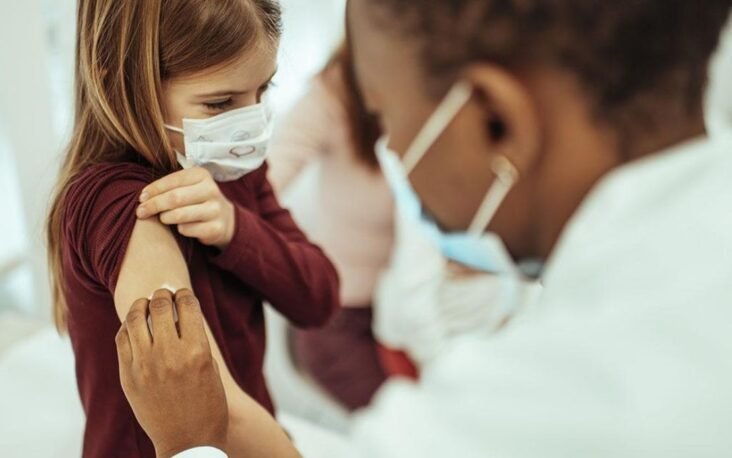
We wish to notify you of our grave concerns regarding all proposals to administer COVID-19 vaccines to children. Recently leaked Government documents suggested that a COVID-19 vaccine rollout in children over 12 years old is already planned for September 2021, and the possibility of children as young as 5 years old being vaccinated in the summer in a worst-case scenario.1
We have been deeply disturbed to hear several Government and SAGE representatives calling in the media for the COVID-19 vaccine rollout to be “turning to children as fast as we can”.2 Teaching materials circulated to London schools contain emotionally loaded questions and inaccuracies3. In addition, there has been disturbing language used by teaching union leaders, implying that coercion of children to accept the COVID-19 vaccines through peer pressure in schools was to be encouraged, despite the fact that coercion to accept a medical treatment is against UK and International Laws and Declarations.4 Rhetoric such as this is irresponsible and unethical, and encourages the public to demand the vaccination of minors with a product still at the research stage and about which no medium- or long-term effects are known, against a disease which presents no material risk to them. A summary of our reasons is given below and a more detailed fully referenced explanation is available.5
Risks and benefits in medical treatments
Vaccines, like any other medical treatment, come with varied risks and benefits. Therefore, we must consider each product, individually, on its merits, and specifically for which patients or sections of the population is the risk/benefit ratio acceptable. For COVID-19 vaccines, the potential benefits are clear for the elderly and vulnerable, however, for children, the balance of benefit and risk would be quite different. We are raising these concerns as part of an informed debate, which is a vital part of the proper, scientific process. We must ensure that there is no repeat of any past tragedies which have occurred especially when vaccines are rushed to market. For example, the swine flu vaccine, Pandemrix, rolled out following the pandemic of 2010, resulted in over one thousand cases of narcolepsy, a devastating brain injury, in children and teenagers, before being withdrawn.6 Dengvaxia, a new vaccine against Dengue, was also rolled out to children ahead of the full trial outcomes, and 19 children died of possible antibody dependent enhancement (ADE) before the vaccine was withdrawn.7 We must not risk a repeat of this with the COVID-19 vaccines, which would not only impact on the children and families affected, but would also have a hugely damaging effect on vaccination uptake in general.
No medical intervention should be introduced on a ‘one size fits all’ basis, but instead should be fully assessed for suitability according to the characteristics of the age cohort and of the individuals concerned, weighing up the risk versus benefit profile for each cohort and the individuals within a group. This approach was outlined last October, by the head of the Government Vaccine Task Force, Kate Bingham, who said “We just need to vaccinate everyone at risk. There’s going to be no vaccination of people under 18. It’s an adult-only vaccine, for people over 50, focusing on health workers and care home workers and the vulnerable.”8
Children do not need vaccination for their own protection
Healthy children are at almost no risk from COVID-19, with risk of death as low as 1 in 2.5 million9. No previously healthy child under the age of 15 died during the pandemic in the UK and admissions to hospital or intensive care are exceedingly rare10 with most children having no or very mild symptoms. Although Long-Covid has been cited as a reason for vaccinating children, there is little hard data. It appears less common and much shorter-lived than in adults and none of the vaccine trials have studied this outcome11 12. The inflammatory condition, PIMS, was listed as a potential adverse effect in the Oxford AstraZeneca children’s trial13. Naturally acquired immunity will give broader and better lasting immunity than vaccination14. Indeed, many children will already be immune15. Individual children at very high risk can already receive vaccination on compassionate grounds16.
Children do not need vaccination to support herd immunity
Already, two thirds of the adult population have received at least one dose of a COVID-19 vaccine17. Models that assume vaccination of children is required to reach herd immunity have failed to account for the proportion who had immunity prior to March 2020 and those who have acquired it naturally18. Recent modelling suggested that the UK had achieved the required herd immunity threshold on 12 April 2021.19
Children do not transmit SARS-CoV-2 as readily as adults, moreover adults living or working with young children are at lower risk of severe COVID-1920. Schools have not been shown to be the focus on spread to the community, teachers have a lower risk of COVID-19 than other working age adults21.
Short-term safety concerns
As of 13th May, the MHRA22 has received a total of 224,544 adverse events, including 1,145 deaths in association with SARS-CoV-2 vaccines. Reports of strokes due to cerebral venous thromboses were initially in low numbers but as awareness increased, many more reports led to the conclusion that AstraZeneca vaccine should not be used for adults under 40 years of age and this unpredicted finding has also led to the suspension of the Oxford AstraZeneca children’s trial.
Similar events have been noted with Pfizer & Moderna vaccines on the US adverse reporting system (VAERS)23 and it is likely that this is a class effect related to production of spike protein. New UK guidelines on managing Vaccine-Induced Thrombotic Thrombocytopenia (VITT)24 include all COVID-19 vaccines in their advice. The possibility of further unexpected safety issues cannot be ruled out. In Israel, where the vaccines have been widely rolled out to young people and teenagers, the Pfizer vaccine has been linked to several cases of myocarditis in young men25 and concerns have been raised about reports of altered menstrual cycles and abnormal bleeding in young women following the vaccine.26
Most concerning with regard to possible vaccination of children, is that there have now been a number of deaths associated with vaccination reported to VAERS in the US, despite the vaccines only being given to children within trials and a very recent rollout to 16-17 year olds27.
Long-term safety concerns
All Phase 3 COVID-19 vaccine trials are ongoing and not due to conclude until late 2022/early 2023. The vaccines are, therefore, currently experimental with only limited short-term and no long-term adult safety data available. In addition, many are using a completely new mRNA vaccine technology, which has never previously been approved for use in humans28. The mRNA is effectively a pro-drug and it is not known how much spike protein any individual will produce. Potential late-onset effects can take months or years to become apparent. The limited children’s trials undertaken to date are totally underpowered to rule out uncommon but severe side effects.
Children have a lifetime ahead of them, and their immunological and neurological systems are still in development, making them potentially more vulnerable to adverse effects than adults. A number of specific concerns have been raised already, including autoimmune disease and possible effects on placentation and fertility.29 A recently published paper raised the possibility that mRNA COVID-19 vaccines could trigger prion-based, neurodegenerative disease30. All potential risks, known and unknown, must be balanced against risks of COVID-19 itself, so a very different benefit/risk balance will apply to children than to adults.
Conclusion
There is important wisdom in the Hippocratic Oath which states, “First do no harm”. All medical interventions carry a risk of harm, so we have a duty to act with caution and proportionality. This is particularly the case when considering mass intervention in a healthy population, in which situation there must be firm evidence of benefits far greater than harms. The current, available evidence clearly shows that the risk versus benefit calculation does NOT support administering rushed and experimental COVID-19 vaccines to children, who have virtually no risk from COVID-19, yet face known and unknown risks from the vaccines. The Declaration of the Rights of the Child states that, “the child, by reason of his physical and mental immaturity, needs special safeguards and care, including appropriate legal protection”.31 As adults we have a duty of care to protect children from unnecessary and foreseeable harm.
We conclude that it is irresponsible, unethical and indeed, unnecessary, to include children under 18 years in the national COVID-19 vaccine rollout. Clinical trials in children also pose huge ethical dilemmas, in light of the lack of potential benefit to trial participants and the unknown risks. The end of the current Phase 3 trials should be awaited as well as several years of safety data in adults, to rule out, or quantify, all potential adverse effects.
We call upon our governments and the regulators not to repeat mistakes from history, and to reject the calls to vaccinate children against COVID-19. Extreme caution has been exercised over many aspects of the pandemic, but surely now is the most important time to exercise true caution – we must not be the generation of adults that, through unnecessary haste and fear, risks the health of children.
Signatories
Dr Rosamond Jones, MD, FRCPCH, retired consultant paediatrician
Lord Moonie, MBChB, MRCPsych, MFCM, MSc, House of Lords, former parliamentary undersecretary of state 2001-2003, former consultant in Public Health Medicine
Prof Anthony Fryer, PhD, FRCPath, Professor of Clinical Biochemistry, Keele University
Professor Karol Sikora, MA, MBBChir, PhD, FRCR, FRCP, FFPM, Dean of Medicine, Buckingham University, Professor of Oncology
Professor Angus Dalgleish, MD, FRCP, FRACP, FRCPath, FMed Sci, Professor of Oncology, St Georges Hospital, London
Professor Richard Ennos, MA, PhD. Honorary Professorial Fellow, University of Edinburgh
Professor Anthony J Brookes, Department of Genetics & Genome Biology, University of Leicester
Professor Keith Willison, PhD, Professor of Chemical Biology, Imperial, London
Dr John A Lee, MBBS, PhD, FRCPath, retired Consultant Histopathologist, former Clinical Professor of Pathology at Hull York Medical School
Professor John A Fairclough, BM BS, BMed Sci, FRCS, FFSEM(UK), Professor Emeritus, Honorary Consultant Orthopaedic Surgeon
Dr Alan Mordue, MBChB, FFPH (ret). Retired Consultant in Public Health Medicine & Epidemiology
Dr Elizabeth Evans, MA, MBBS, DRCOG, retired doctor
Mr Malcolm Loudon, MB ChB, MD, FRCSEd, FRCS (Gen Surg). MIHM, VR. Consultant Surgeon
Dr Gerry Quinn, PhD, Microbiologist
Dr C Geoffrey Maidment, MD, FRCP, retired consultant physician
Dr K Singh, MBChB, MRCGP, general practitioner
Dr Pauline Jones MB BS retired general practitioner
Dr Holly Young, BSc, MBChB, MRCP, Consultant physician, Croydon University Hospital
Dr David Critchley, BSc, PhD, 32 years in pharmaceutical R&D as a clinical research scientist.
Dr Padma Kanthan, MBBS, General practitioner
Dr Thomas Carnwath, MBBCh,MA, FRCPsych, FRCGP, consultant psychiatrist
Dr Sam McBride BSc(Hons) Medical Microbiology & Immunobiology, MBBCh BAO, MSc in Clinical Gerontology, MRCP(UK), FRCEM, FRCP(Edinburgh). NHS Emergency Medicine & geriatrics
Dr Helen Westwood MBChB MRCGP DCH DRCOG, general practitioner
Dr M A Bell, MBChB, MRCP(UK), FRCEM, Consultant in Emergency Medicine, UK
Mr Ian F Comaish, MA, BM BCh, FRCOphth, FRANZCO, Consultant ophthalmologist
Dr Jayne LM Donegan MBBS, DRCOG, DCH, DFFP, MRCGP, general practitioner
Dr Dayal Mukherjee, MBBS MSc
Dr Clare Craig, BM,BCh, FRCPath, Pathologist
Mr C P Chilton, MBBS, FRCS, Consultant urologist emeritus
Dr Theresa Lawrie, MBBCh, PhD, Director, Evidence-Based Medicine Consultancy Ltd, Bath
Dr Jason Lester, MRCP, FRCR, Consultant Clinical Oncologist, Rutherford Cancer Centre, Newport
Dr Scott McLachan, FAIDH, MCSE, MCT, DSysEng, LLM, MPhil., Postdoctoral researcher, Risk & Information management Group
Michael Cockayne, MSc, PGDip, SCPHNOH, BA, RN, Occupational health practitioner
Dr John Flack, BPharm, PhD. Retired Director of Safety Evaluation at Beecham Pharmaceuticals 1980-1989 and Senior Vice-president for Drug Discovery 1990-92 SmithKline Beecham
Dr Stephanie Williams, Dermatologist
Dr Greta Mushet, retired Consultant Psychiatrist in Psychotherapy. MBChB, MRCPsych
Dr JE, MBChB, BSc, NHS hospital junior doctor
Mr Anthony Hinton, MBChB, FRCS, Consultant ENT surgeon, London
Dr Elizabeth Corcoran, MBBS,MRCPsych,Psychiatrist
Dr Alan Black, MB BS MSc DipPharmMed, retired pharmaceutical physician
Dr Christina Peers, MBBS,DRCOG,DFSRH,FFSRH, Consultant in Contraception & Reproductive Health
Dr Marco Chiesa, MD, FRCPsych, Consultant Psychiatrist & Visiting Professor, UCL
Elizabeth Burton, MB ChB, retired general practitioner
Noel Thomas, MA, MB ChB, DCH, DObsRCOG, DTM&H, MFHom, retired doctor
Malcolm Sadler, MBBS, FRCGP, retired general practitioner with 37 years in Medical Practice
Dr Ian Bridges, MBBS, Retired general practitioner
Mr T James Royle MBChB, FRCS(Ed), MMedEd, Consultant colorectal surgeon
Dr Fiona Martindale, MbChB, MRCGP, GP in out of hours
Dr Karen Horridge, MB ChB(Hons), MSc, MRCP, FRCPCH, Consultant Paediatrician (Disability)
Mr Christian Duncan, Consultant Plastic Surgeon, MB BCh, BAO, MPhil, FRCSI, FRCS (Plast)
Dr David Bramble, MBChB, MRCPsych, MD. Consultant Psychiatrist
Dr Jessica Robinson, BSc(Hons), MBBS, MRCPsych, MFHom, Psychiatrist & Integrative Medicine Doctor
Katherine MacGilchrist, BSc (Hons) Pharmacology, MSc Epidemiology, CEO, Systematic Review Director, Epidemica Ltd
David Halpin MB BS, FRCS, Orthopaedic and trauma surgeon (retired)
Jemma Dale, BSc (Hons), Biomedical Scientist
Dr Helen Macklin, MBBS, DRCOG, MRCGP, general practitioner
Dr Mark Atkinson, MBBS, BSc (Hons), FRSPH. Retired Medical Doctor
Dr Anne Renfrew, MB ChB, MRCOG, MRCGP, DCH, Retired general practitioner
Dr S Allam, MB ChB, FRCA, Consultant Anaesthetist, UK
Dr David Morris, MBChB, MRCP(UK), General Practitioner
Dr. Peter Chan, BM, MRCS, MRCGP, General Practitioner, Functional medicine practitioner
Dr Sam White, MBChB, MRCGP, General Practitioner, Functional medicine practitioner
Dr Rohaan Seth, MBChB, BSc, MRCGP, General Practitioner



